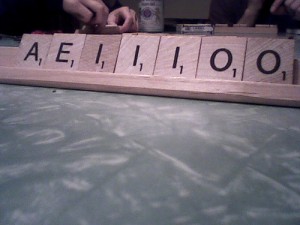
Flickr Creative Commons/semarr
So here’s a question we were asked last week by a reader:
“Random question. Woman = vrouw; women = vrouwen. Why not vrouwwen (ie man -> mannen, etc)?”
Excellent question!
Here’s the deal…
As in English, vowels in Dutch can have both the long sound (been, maan) and short sound (ben, kat). In Dutch, the long vowel sound is denoted by doubling up on the vowel in question. For example, maan (moon) and been (leg) both get the long vowel sound as opposed to man (man) or bot (bone) which get the short vowel sound.
So, the short answer is, the double “n” in mannen keeps the “a” in the word man short. Without that second “n,” you’ve got manen, with a long “a” sound, which means moons.
For more on vowels, check out this past post on spelling Dutch words with long vowel sounds and this one on spelling Dutch words with short vowel sounds.
The word vrouw (woman) uses the “ou” vowel combination. Unlike “a” and “e,” which can take on the long or short vowel sound, “ou” always makes the same sound (ow). Because we only need that double consonant to keep the short vowels short when the word becomes plural, it’s not needed in words like vrouw. So all we need to do is add an “en” on the end to make it vrouwen (women)
Some others to watch out for:
Long vowels:
been -> leg
plural: benen -> legs
*bennen is not a word
teen -> toe
plural: tenen -> toes
*tennen is not a word
zoon -> son
plural: zonen -> sons
*zonnen means suns
boot -> boat
plural: boten -> boats
*botten means bones
Short vowels
bed -> bed
plural: bedden -> beds
*beden is the plural for plea/prayer that is no longer used
man -> man
plural: mannen -> men
*manen means moons
pit -> pit/stone
plural: pitten -> pits/stones
*piten is not a word
But here’s the thing. Every rule has exceptions and some rules have no rhyme or reason behind them. One such exception is woord (word). Woord has the long vowel sound so, based on the examples above, the plural (words) should be worden. However, worden means “to become” NOT “words.”
What is the Dutch word for “words” then? It’s woorden. More on why in another post.
For more, you can also go back to this post on Dutch plurals.
So, learn the rule, but be flexible. And take it easy on yourself. Learning a language is a challenge. Some things won’t make sense, others will simply drive you crazy. But just keep plugging along and you’ll get there. You can do this!






Comments:
saloni:
Why is woorden an exception? Because woord is the singular form. When we add en to make it plural, it becomes woorden. And according to the syllable rules, it is woor+den. The first syllable isnot ending as open syllable as woorden has two vowels and the first syllable gets r as the consonant so there is no need to remove the o. So i dont feel woorden is an exception. Kindly correct me if i am wrong. Thanks
saloni:
Ok now its clear after reading the second part. Thanks. I love your blogs!
Willem Koper:
We double consonants to maintain de short vowel sound . OK
Only when the syllable ( singular ) ends with a single consonant. NOT with two or more.
Better learn the irregular plural forms as well.
Kind… KindEREN
Trimmerman… TimmerLIEDEN.
Museum… MuseA
Sofa… Sofa’S
Be careful when you cut words in syllables at the end of a sentence.
Usually you divide the consonants in the same amount at the end and beginning of the syllables.
Han-den. Per-ken.
Compound words are tricky though!
Herfst- bladeren NOT herfs-tbladeren.
Ricardo Valle:
For the sake of clarity, there is a correction to make to your interesting article. Where it says:
However, worden means “to become” NOT “words.”
it should say:
However, worden means “to become,” NOT “words.”
Otherwise, reading this sentence is confusing.
Best regards.